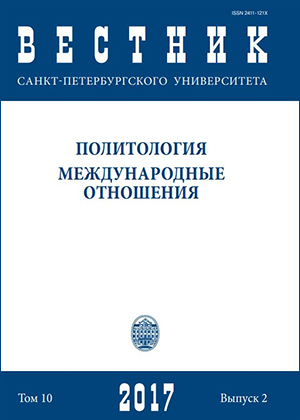(Ir-)rationality and Ethical Relativism in Realist and Postpositivist International Relations Paradigms
DOI:
https://doi.org/10.21638/11701/spbu06.2017.207Abstract
The hypothesis worked out in the article is that realism and postpositivism in international relations theory have been pervaded by notions of rationality inadequate to contemporary philosophy, and that this has largely lead both paradigms into comparable problems of ethical relativism. The article offers a study of the flaws of instrumentalism in realism and of the debasement of the role of rationality in postpositivism that these ethical problems result from. The contributions that contemporary conceptions of rationality could offer to the discussion of ethical problems in international relations are also pointed out in the article. Refs 27.
Keywords:
international relations theory, realism, postpositivism, rationality, ethics
Downloads
References
References
George J. Realist ‘Ethics’, International Relations, and Post-modernism: Thinking Beyond the EgoismAnarchy Thematic. Millennium, 1995, vol. 24, no. 2, pp. 195–223.
Gudalov N.N. K voprosu o skhodstvakh politicheskogo realizma i postpozitivizma v teorii mezhdunarodnykh otnoshenii [On Some Similarities between Political Realism and Postpositivism in International Relations Theory]. Politika i Obschestvo [Politics and Society], 2016, no. 7, pp. 874–884. (In Russian)
Steinberger P.J. Rationalism in Politics. American Political Science Review, 2015, vol. 109, no. 4, pp. 750–763.
Kahler M. Rationality in International Relations. International Organization, 1998, vol. 52, no. 4, pp. 919–941.
Nicholson M.Rationality and the Analysis of International Conflict. Reprinted. Cambridge, Cambridge University Press, 1997. xvi+260 p.
Mercer J. Rationality and Psychology in International Politics. International Organization, 2005, vol. 59, no. 1, pp. 77–106.
Putnam H. Reason, Truth and History. Reprinted. Cambridge, Cambridge University Press, 1998. xii+223 p.
Nozick R. The Nature of Rationality. Princeton, NJ, Princeton University Press, 1993. xvi+226 p.
Horkheimer M. Eclipse of Reason. London, New York, Continuum Publ., 2004. viii+130 p.
Palan R.P., Blair B.M. On the idealist origins of the realist theory of international relations. Review of International Studies, 1993, vol. 19, no. 4, pp. 385–399.
Brubaker R. The Limits of Rationality. An Essay on the Social and Moral Thought of Max Weber. Reprinted. London, Routledge Publ., 1991. viii+120 p.
Jackson P.T. The Conduct of Inquiry in International Relations. Philosophy of science and its implications for the study of world politics. Abingdon, Routledge Publ., 2010. E-book. xiv+268 p.
Weber M. The Profession and Vocation of Politics. Weber: Political Writings. Eds P.Lassman, R. Speirs. Reprinted. Cambridge, Cambridge University Press, 2003, pp. 309–369.
Wight M. International Theory. The Three Traditions. Eds Gabriele Wight, Brian Porter. New York, Holmes & Meier for The Royal Institute of International Affairs, London, 1992. xxviii+286 p.
Hobbes T. Leviathan. Ed. by J.C.A.Gaskin. Reissued. Oxford, Oxford University Press, 1998. lvi+520 p.
Morgenthau H.J. Scientific Man vs. Power Politics. London, Latimer House Limited, 1947. 207 p.
Morgenthau H.J. Politics among Nations: The Struggle for Power and Peace. 5th ed., revised. New York, Alfred A.Knopf Publ., 1978. xxviii+650 p.
Waltz K.N. Theory of International Politics. Reading, MA, Addison-Wesley Publishing Company, 1979. 251 p.
Glaser C.L. Rational Theory of International Politics: the logic of competition and cooperation. Princeton, NJ, Princeton University Press, 2010. xiv+314 p.
Farrands C. Gadamer’s enduring influence in international relations: interpretation in Gadamer, Ricoeur and beyond. International Relations Theory and Philosophy: interpretive dialogues. Eds C.Moore, C.Farrands. Abingdon, Routledge Publ., 2010, pp. 33–45. E-book.
Aradau C. Derrida: aporias of otherness. International Relations Theory and Philosophy: interpretive dialogues. Eds C.Moore, C.Farrands. Abingdon, Routledge Publ., 2010, pp. 107–118. E-book.
Mouffe C. Agonistics. Thinking the World Politically. London, Verso, 2013. E-book.
Neumann I.B. Uses of the Other: “The East” in European Identity Formation. Minneapolis, MN, University of Minnesota Press, 1999. xvi+283 p.
Brown C. The ‘Practice Turn’, Phronesis and Classical Realism: Towards a Phronetic International Political Theory? Millennium, 2012, vol. 40, no. 3, pp. 439–456.
Audi R. The Architecture of Reason: The Structure and Substance of Rationality. New York, Oxford University Press, 2002. xvi+286 p.
Lebow R.N. Constructing Cause in International Relations. Cambridge, Cambridge University Press, 2014. x+196 p.
Sebo J. Utilitarianism, Multiplicity and Liberalism. Utilitas, 2015, vol. 27, no. 3, pp. 326–346.
Downloads
Published
How to Cite
Issue
Section
License
Articles of "Vestnik of Saint Petersburg University. International relations" are open access distributed under the terms of the License Agreement with Saint Petersburg State University, which permits to the authors unrestricted distribution and self-archiving free of charge.




